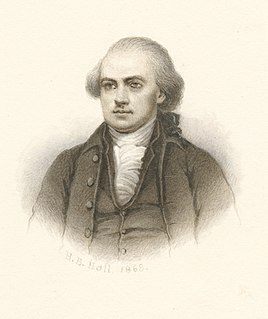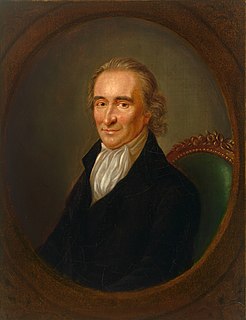 W
WNicholas Cooke was a governor of the Colony of Rhode Island and Providence Plantations during the American Revolutionary War, and after Rhode Island became a state, he continued in this position to become the first Governor of the State of Rhode Island. Born in the maritime town of Providence, he early in life followed the sea, eventually becoming a Captain of ships. This occupation led him to become a slave trader, becoming highly successful in this endeavor, and he ran a distillery and rope-making business as well. He is depicted as one of the affluent merchants in John Greenwood's satirical painting from the 1750s entitled Sea Captains Carousing in Surinam.
 W
WWilliam Ellery was a signer of the United States Declaration of Independence as a representative of Rhode Island. In 1764, the Baptists consulted with Ellery and Congregationalist Reverend Ezra Stiles on writing a charter for the college that became Brown University. Ellery and Stiles attempted to give control of the college to the Congregationalists, but the Baptists withdrew the petition until it was rewritten to assure Baptist control. Neither Ellery nor Stiles accepted appointment to the reserved Congregationalist seats on the board of trustees.
 W
WTheodore Foster was an American lawyer and politician from Rhode Island. He was a member of the Federalist Party and later the National Republican Party. He served as one of the first two United States senators from Rhode Island and, following John Langdon, served as dean of the Senate.
 W
WThe Founding Fathers of the United States, or simply the Founding Fathers or Founders, were a group of American revolutionary leaders who united the Thirteen Colonies, led the war for independence from Great Britain, and built a frame of government for the new United States of America upon classical liberalism and republican principles during the latter decades of the 18th century.
 W
WStephen Hopkins was a governor of the Colony of Rhode Island and Providence Plantations, a Chief Justice of the Rhode Island Supreme Court, and a signer of the Declaration of Independence. He was from a prominent Rhode Island family, the grandson of William Hopkins who served the colony for 40 years as Deputy, Assistant, Speaker of the House of Deputies, and Major. His great grandfather Thomas Hopkins was an original settler of Providence Plantation, sailing from England in 1635 with his cousin Benedict Arnold who became the first governor of the Rhode Island colony under the Royal Charter of 1663.
 W
WThomas Paine was an English-born American political activist, philosopher, political theorist, and revolutionary. He authored Common Sense (1776) and The American Crisis (1776–1783), the two most influential pamphlets at the start of the American Revolution, and helped inspire the patriots in 1776 to declare independence from Great Britain. His ideas reflected Enlightenment-era ideals of transnational human rights.
 W
WJonathan Trumbull Sr. was an American politician and statesman who served as Governor of Connecticut during the American Revolution. Trumbull and Nicholas Cooke of Rhode Island were the only men to serve as governor of both a British colony and an American state, and he was the only governor to take up the Patriot cause at the start of the Revolutionary War. Trumbull College at Yale University, the town of Trumbull, Connecticut, Trumbull County, Ohio, and Jonathan the Husky are all named for him.
 W
WSamuel Ward was an American farmer, politician, Supreme Court Justice, Governor of the Colony of Rhode Island and Providence Plantations, and delegate to the Continental Congress. He was the son of Rhode Island governor Richard Ward, was well-educated, and grew up in a large Newport, Rhode Island family. After marrying, he and his wife received property in Westerly, Rhode Island from his father-in-law, and the couple settled there and took up farming. He entered politics as a young man and soon took sides in the hard-money vs. paper-money controversy, favoring hard money or specie. His primary rival over the money issue was Providence politician Stephen Hopkins, and the two men became bitter rivals—and the two also alternated as governors of the Colony for several terms.
 W
WJoseph Warren was an American physician who played a leading role in Patriot organizations in Boston during the early days of the American Revolution, eventually serving as President of the revolutionary Massachusetts Provincial Congress. Warren enlisted Paul Revere and William Dawes on April 18, 1775, to leave Boston and spread the alarm that the British garrison in Boston was setting out to raid the town of Concord and arrest rebel leaders John Hancock and Samuel Adams. Warren participated in the Battles of Lexington and Concord the following day, which are commonly considered to be the opening engagements of the American Revolutionary War.